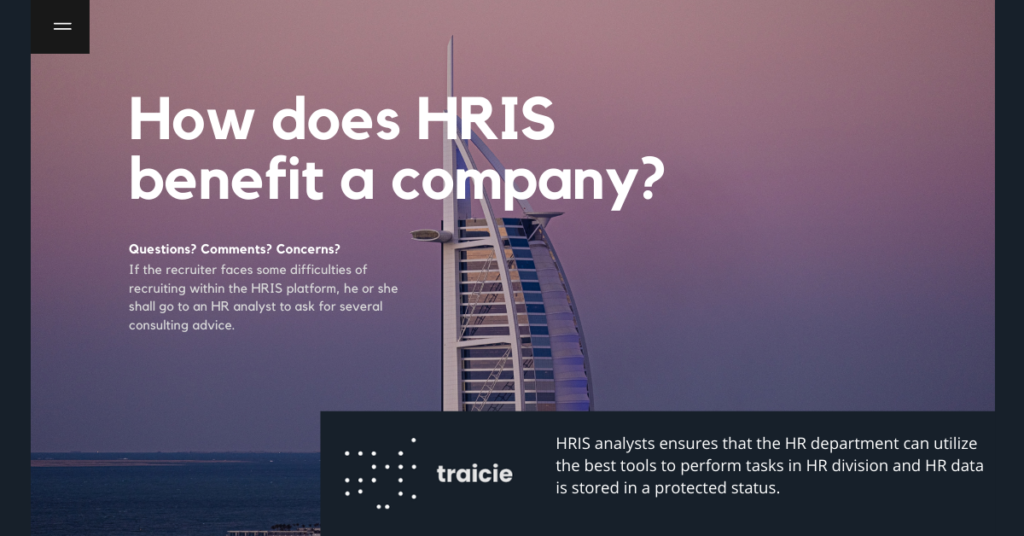What is an HRIS analyst? And what does a HRIS analyst do? Do you know it is the versatile bridge connecting the IT and data expert in the HR department. The HR Information System analyst job has become more and more trendy these days, being chased by a great number of companies given that almost every company needs HR professionals and analysts to properly target their business goals.
In this article, we shall explain who HRIS analysts are, their role and responsibilities, salary range, best certifications to take and career path to become a HRIS analysts.
Who is a HRIS analyst?
First, let’s get to know about the term HRIS, which stands for Human Resource Information System and is one of the most widely used software in HR department nowadays.
HRIS is a functional system used for collecting, organizing and storing crucial data about organizations’ employees. In most cases, HRIS can serve a whole package of human resource management processes ranging from recruitment, performance management to learning and development and more.
| >>> But first, it is crucial to understand deeply about HRIS systems meaning and benefits for your company.
Besides from being called Human Resources Information System – HRIS, the software can also be referred as Human Resource Management System – HRMS or Human Capital Management System.
HRIS analyst refers to the person who oversees and manages an HRIS system which include the employee benefit data, payroll and so on. HR analyst becomes a merge between IT and human resources within the HR department. HRIS analysts are commonly referred as HRIS consultant or HRIS specialist.
HRIS analyst’s daily tasks shall include controlling the HRIS system, implementing and recommending improvements and updates, assuring data quality, and designing reports using data downloaded from the HRIS. The person is meant to optimize the performance of HR technologies in an organization, help to solve IT problems, formulate new HRIS processes and support the HR manager.
Why there is a need for HRIS analysis?
How does HRIS benefit a company? This individual is like Mr.Knowitall when it comes to HRIS system of the company. If the recruiter faces some difficulties of recruiting within the HRIS platform, he or she shall go to an HR analyst to ask for several consulting advice.

Moreover, in case of any system updates, HRIS analyst can provide training for employees in the HR division on how to use the new functions in the HRIS system. HRIS analysts ensures that the HR department can utilize the best tools to perform tasks in HR division and HR data is stored in a protected status.
Do you wonder how traicie’s tools can help HRBP in strategic operational value in human resource management?
HRIS analyst cooperates with numerous other employees, working behind the scenes to make sure everything is set up right, processes flows and other things are in place so that all other aspects of HR can happen. Those important job characteristics make HRIS analyst a key role in a company.
What does an HRIS analyst do?
An HRIS analyst deals with a list of daily duties which may vary based on each company’s characteristics. However, HRIS analysts shall share several tasks in common such as controlling and updating the Human Resources Information Systems.
The individuals need to carefully supervise how HRIS system is doing and figure out how to make proper improvements on the bottlenecks of the system. Besides from monitoring the HRIS system in couple with enabling necessary updates, the HRIS analyst is also responsible for ensuring data quality and making cohesive analysis and reports using the HR data collected from the HRIS.

The HRIS analyst is often the professional whom every HR employee will turn to with regards to any problems of the HRIS system in the company. HR data that HRIS analyst tackle on their job may possibly the employee records, turnover rate, payroll, and time off.
Responsibilities and Duties of an HRIS Analyst:
What are the skills necessary for the HRIS analyst position?
- Analyze HRIS performance index, ensuring the ease to access to HR database, HR description and communication template within the HRIS and solving system problems.
- Collaborate with HR managers and other employees in HR division to identify HRIS needs for smooth HR operations.
- Build up processes, investigate into HR concerns, carry out data analyses and reports.
- Keep up with the technological advancements and new features regarding the HRIS and providing trainings or conferences if needed.
- Collect relevant data and implement integrated data analysis on the collected HR data.
- Ensuring the success of periodic HRIS system updates, efficient HR data storage and data quality
- Check up on HR processes such as recruiting, hiring, termination of service, or payroll management and recommend change in policies
- Understand about business performance & user demands to convert their needs into technical requirements
How to Become an HRIS Analyst: Complete Career Path
Is HRIS analyst a good job? In fact, there may not be any fixed formula for job seekers to become HRIS experts.

Numerous cases show that when staff in HR and IT are shifted to take on the tasks of handling HRIS systems, they can equip themselves with crucial hands-on learning needed for them to work full-time as HRIS analysts.
| >>> You might also wonder: How to become a HRBP – Human Resources Business Partner?
For example, staff in HR department that used to only handle HR recruiting task then rolls over to be a full-time HRIS analyst can learn more IT competencies and analytical skills to manage the system and carry out statistical reports. However, let’s investigate more into the cases of many HRIS analysts to see how they land their dream jobs.
How do I start an HRIS analyst?
- Earn a bachelor degree
Statistics show that about 98% of people working as a HRIS Analyst earned a Bachelor’s degree in IT, Computer Science, Human Resource Management, Business Administration, thus, it sounds a good idea if you earn a bachelor degree to win the competition against other job applicants. On the other hand, If you study a non IT bachelor degree at university, you may need to learn about statistical analysis, database management, SQL queries, SAS Visual Analytics, Tableau/Power BI, Oracle, Agile management
- Take a HRIS Analyst internship opportunity
In a great number of universities, students must apply for an accredited internship program from 3 to 6 months to get work experience and learn crucial practical skills before entering the workforce. It is highly recommended that future HRIS analysts should join an internship to sharpen their skills and increase their chances of getting their desired jobs.
There are some useful job sites that you may find a variety of internship opportunities in HR
Try out some websites such as LinkedIn, Accenture, Indeed, Glassdoor, search the keyword “HR analyst intern” on Google and also do not forget to turn to your local job portals and job fairs held by the university you are currently studying.
- Apply for an entry-level HRIS job
After having acquired a Bachelor’s Degree in the related field, you’ll typically begin your career as a junior HRIS Analyst. In most of the cases, you can land your first job as HRIS Analyst after completing your 4 year Bachelor’s Degree in a related discipline and possessing crucial skills needed for the job.
Based on the type of HRIS Analyst role that you are taking on, you may need to be equipped with additional on-the-job skills and advanced certifications as can be seen in later part.
- Get ahead in your career as an HRIS analyst
Once you have completed being HRIS analyst which usually takes around 2 years, you can start making progress toward the senior HRIS analyst. Each advanced HRIS Analyst position requires about 2 years of experience at each level to advance in your HRIS Analyst career path.
It may be vital to acquire further education, a post graduate degree such as a Master’s Degree in IT field or HR field, or advanced certifications in order to set you up in the right path to attain HRIS Senior professional expert.
Best reputed certifications to thrive in your HRIS analyst job
- SHRM certification
The Society for Human Resource Management (SHRM) offers two competency-based certifications, the SHRM Certified Professional (SHRM-CP) for early- and mid-career HR staff and the SHRM Senior Certified Professional (SHRM-SCP) for senior-level professionals.
Taking these courses, students shall learn 8 competencies divided into 3 clusters : leadership (leadership and navigation, ethical practice), interpersonal (relationship management, communication, global and cultural effectiveness), and business (business acumen, consultation, critical evaluation).
HR employees whose jobs are to build HR policies and strategies, serve as point of contact for staff and stakeholders and offer HR services, and HR operational functions will be interested in the SHRM-CP.

Whereas, the SHRM-SCP certification is uniquely made for senior-level experts whose job is to strategize, lead the HR management, stimulate influence in the association, do analysis on performance index, and ensure HR strategies fit with business objectives.
- HRIP certification
This certification is offered by the International Association of Human Resources Information Management (IHRIM).
The course goes through various aspects of HRIM/HRIS such as technology, HRIS functions, latest HR trends and best practices. Practitioners after spending at least 60 credit learning hours and passing the exam will be validly certified within three years.
- HRCI certification
The HR Certification Institute (HRCI) organizes courses and exams for HR professionals of all work experience level. To enroll into the course and take the final exam, you need to show your dedication, credibility and a deep understanding of the HR principles plus with proven work experience and academic requirements. HRCI certification is valid for 3 years so that the ones who pass the exam must retake the it after the certification’s expiration date.
- aPHR
HRCI’s Associate Professional in Human Resources (aPHR) is where entry level HRIS analyst can start with. It is great that no previous work experience in HR department is requested to take this exam. To pass the test, you shall need to learn about HR operations, employee relations, recruitment and hiring, employee benefits, and HR development and retention, as well as health, safety and security.
Check out this website for more details of which certifications to acquire to get ahead in your career as HRIS analyst job: https://www.cio.com/article/220148/top-hris-certifications-to-boost-your-career.html
To HRIS Analyst Job Description or build a HR Information System Analyst Resume what skills needed?
| Business Process | System analytics abilities, data integrity and business processes and to make recommendations for improvements in order to support data integrity efforts.Acquire technical business insights on business processes consisting of: Organizational Management, Personnel Administration, Benefits Administration, and Payroll.Identify business objectives, perform needs analysis and gather business requirements to align HR practices with business strategiesEnsure data quality and recommend management team to apply HRIS technology enhancement into practice.Provided in-depth review, analysis and development of business systems and internal business processes for HRIS applications. |
| Information Technology | Having a solid background in IT or HR Management/ Business Administration, preferably hands-on experience in HRIS.Develop user acceptance test plans for programs developed by Information Technology to ensure quality and compliance.liaison between HR department and IT department to manage HRIS.Know how to do SQL queries, provide triage application database support.Generate and process weekly interface for Payroll, Benefits departments and external vendors using SQL.Design and develop applications using SQL, Visual Basic, and other programming languages and application software |
| Data Analysis | Extract data from various data stores to achieve desired analysisParticipate in preparation of written reports and oral presentations summarizing data analysis results.Provide reports and data analysis for training and performance management metrics.Do auditing of HRIS data for data integrity, ensure effective security access to personnel data to safeguard data integrity develop HR processes to maintain data integrity.Provide reports and data analysis to management and executives.Provided support to senior leadership for data analysis.Create, program and provide upper management workforce (head count) and turnover data analysis reports. |
| Technical Support | Provide technical and system support to HR department and consult others on HR system issues through training sessions, conferences HRIS analyst must possess effective communication skills and significant technical knowledge Solve system errors, debug coding to ensure smooth HR system operationsCollaborate with IT and HR department to identify problems and implement systems solutions. |
| Functional Areas | Work with functional areas to identify roles, manage projects and recommend improvements Run ad hoc and compile reports to support HR/Payroll functional areas Brainstorm job descriptions of HRIS analyst for recruitment Implement functional areas in SAP-OM to align reporting with the fluid structure of the organization. Lead effort to improve processes, data security and integrity for HR functional areas. |
HRIS analyst salary
How much do hris analyst make ? Just like other occupations, salary ranges for the HRIS analyst job may be different based on work experience level, type of organization and geographical location.
According to salary.com, the average salary for HRIS analyst in the United States as of August 2021 is $59,791 a year, but the range is from $57,356 to $75,871 a year.
Glassdoor website shows that the average salary of HRIS analyst is $65,551 per yearLooking at Indeed metrics, in the United States of America, HRIS shall earn a similar base salary of $73,586 a year as the number given by salary.com. Based on these numbers found on 2 websites, it can be said that HRIS analysts living in the United States of America will earn from $57K to $75K a year.a
According to Glassdoor, in London, England, the average HRIS analyst salary is 45.728 £ a year. In France, the average salary as an HRIS analyst is about € 50,000 per year.
That salary range sounds pretty attractive for a great number of job seekers in comparison with other occupations.
Conclusion
In summary, HRIS Analyst job with its important roles is becoming more and more needed by numerous numbers of companies considering the rise of digital technology and huge volume of HR data.
A proficient HR Analyst can relieve the stress that the IT and HR departments usually must carry on their shoulders by well maintaining HRIS system, convert business objectives into technical requirements to optimize HR processes, boost efficiency and enhance the user experience while using HRIS.
It is highly recommended that if you are trying to be a HRIS analyst, you may prepare yourself with HR knowledge and nurture your technical skills regarding HRIS and database management in couple with paying attention to the company business setting and stick to the long-term goals of the organization you are applying for.
How do I become a successful HRIS analyst?
Because of rapidly changing technology and business environment, HRIS analyst must continuously grasp new knowledge and be open to the most recent upgrades of HR systems and stay up-to-date with changes in business settings. By doing so, the HRIS analysts can be a great contributor to the success of their organizations. From time to time, an HRIS analyst, as the bridge connecting aspects of HR and IT, becomes a key person in the company.
Do you know that traicie’s tools can help HRBP in strategic operational value in recruiting process for term of:
- Cost of a job board- Reduce annual spending on job boards
- Cost of HR’S tools – Reduce the cost of surveys and assessment tools.
- Recruitment costs – Reduce selection costs
- Internal mobility – Fill more skilled jobs with internal staff
- Time to hire – Reduce the number of days a role goes unfilled.
- Salary costs – Reduce overall salary costs
- Attrition – Reduce the rate of turnover
- Recruitment cost – Reduce the general recruitment cost
2 thoughts on “HRIS analyst: jobs description, salary and skills [Updated 2022]”